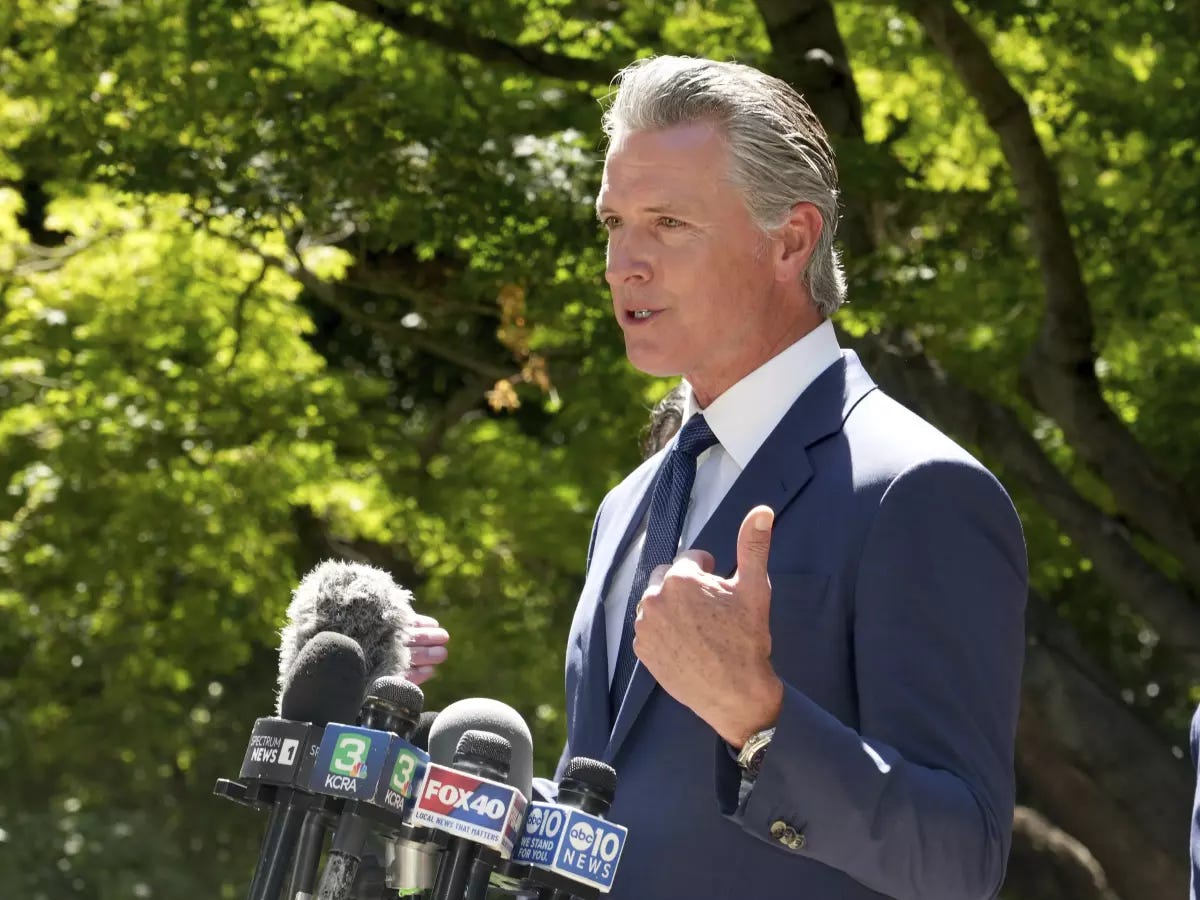“We are not playing”: California Democrats plot redistricting revenge
Plus: Fresh insights on the simmering fight over 2026 government funding, Epstein files, ballooning cost of the GOP megabill and new polling on Trump 2.0.

👋🏾 Hi, hey, hello! Welcome back to Congress Nerd, the flagship newsletter from Once Upon a Hill, where I break down the week’s biggest congressional storylines and chronicle the politics, policies and power players shaping the Democratic Party in the Trump 2.0 era. I’m coming to you a day early since I’m traveling tomorrow (more on that below).
In this edition, you’ll find the latest from my notebook on the redistricting wars on the 60th anniversary of the Voting Rights Act, simmering fight over 2026 government funding, Epstein files, ballooning cost of the GOP megabill and new polling on Trump 2.0.
But first things first, a quick plug: This Friday at the annual National Association of Black Journalists convention in Cleveland, I’ll be joining an all-star group of journalists for a panel discussion on Project 2025, the playbook reshaping American Government.
Moderated by CNN’s Eva McKend, the conversation will feature Yamiche Alcindor (NBC News), Eugene Daniels (MSNBC) and me. We’ll share how Project 2025 factored into our campaign and Trump 2.0 coverage, examine why Republican officials disowned the agenda publicly while embracing it behind the scenes and offer reporting tips for connecting the dots as its ideas are implemented across the executive branch and through Congress.
We’ll also reflect on what we missed, what we got right, and why reporters—especially those covering power through the lens of race, gender, and class—need to treat Project 2025 as more than just an internal Heritage Foundation PDF.
I’m looking forward to what I know will be a fantastic conversation and a wonderful weekend among excellent company.
On another note, my newest COURIER column looks at what it now costs to stay safe while running for—or serving in—public office. A new report from Vote Mama Foundation finds that over 860 federal candidates have spent more than $41 million on personal security since 2014, with a 7,000 percent increase in campaign-funded security expenses over the past decade. Women of color accounted for nearly two-thirds of all security spending by women, underscoring just how uneven the risk has become.
The report comes as members of Congress have returned to their districts and states for the August recess and after House party leaders announced new security enhancements for members to protect themselves and their families against increasing threats of political violence.
Back to the redistricting showdown between California and Texas…
Democrats in the Golden State are preparing a triggered counteroffensive that would redraw the state’s congressional lines if Texas moves forward with its new map.
“We are fighting fire with chemical warfare,” a source familiar with the redistricting plans under consideration in California, who has reviewed early map concepts that could expand the Democratic delegation from 43 to as many as 48 of the state’s 52 House seats, told me this week. “We are not playing.”
California Democrats would have to sidestep the state’s independent redistricting commission to implement the plan, a move that requires legislative approval by a two-thirds vote and a special election to suspend Proposition 11, which established California’s IDR in 2008. Gov. Gavin Newsom has argued that the stakes for House control in 2026 and democratic norms justify aggressive action, while critics, including former Republican Gov. Arnold Schwarzenegger and good-government groups like Common Cause, warn that overriding the commission could undermine public trust and set a dangerous precedent.
More than 30 Texas House Democrats fled the state on Sunday to deny the quorum required for Republicans to formalize a mid-decade redistricting effort targeting five Democratic-held seats, traveling to Illinois, New York and Massachusetts in a coordinated walkout. Republican Gov. Greg Abbott has threatened to arrest absent legislators and fine them daily, though these measures are mostly symbolic given legal limitations.
This standoff reflects a broader national trend: the Supreme Court’s 2019 decision in Rucho v. Common Cause removed federal court oversight of partisan gerrymandering, emboldening states to redraw maps for political gain. Democratic governors in other states, including New York and Maryland, are now exploring similar mid-cycle redraws in anticipation of further GOP map manipulation. The result is an escalating redistricting arms race that could dramatically reshape the House battlefield ahead of the 2026 midterms.
Meanwhile, Democrats tell me they’re finally showing the collective fight their grassroots base has been begging for since President Donald Trump returned to office.
“We have been asked to fight back and that is what we are doing,” the source said. “It is obvious that you cannot negotiate with this administration. The gloves have come off. It is time to stop being performative.”
Want to reach the people shaping policy and politics? Once Upon a Hill puts your message in front of the Capitol’s most plugged-in audience—where influence meets insight. Let’s talk about how a sponsorship can align with your goals. Email michael@onceuponahill.com to learn more.
Speaking of negotiations, Congress will have just a handful of legislative days once it returns to Washington next month to reach an agreement on government funding to avoid a federal shutdown.
Senate Minority Leader Chuck Schumer (D-N.Y.) and House Minority Leader Hakeem Jeffries (D-N.Y.) on Monday sent a letter to Speaker Mike Johnson (R-La.) and House Majority Leader John Thune (R-S.D.) requesting a Big Four meeting this week to discuss a bipartisan path forward to avoid a shutdown and address what they describe as a looming health care crisis.
The two Democratic leaders criticized Republicans for abandoning bipartisanship and pursuing a purely partisan agenda under the Trump administration,
warning that 15 million Americans stand to lose their health care as a result. They pointed to recent bipartisan progress in the Senate appropriations process as proof that cross-party cooperation is still possible if GOP leaders are willing to engage.
“You can work with us to protect health care for the American people and chart a better course for this country,” Schumer and Jeffries wrote. “Americans—whether Republican, Democrat, or Independent—want their leaders to put them first and focus on lowering the cost of living here in America.”
Meanwhile, White House Budget Director Russ Vought hasn’t ruled out submitting a special rescission message before the end of the fiscal year, raising alarms among Democrats about a so-called pocket rescission, which is when the executive branch requests to rescind funds close to their expiration, freezes the money and lets the availability window lapse, effectively canceling the funds without Congress’s approval. Democratic leaders warn such a move could blow up bipartisan budget talks and increase the likelihood of a shutdown.
The Center for American Progress published a report this week from Senior Director of Federal Budget Policy Bobby Kogan on why pocket rescissions violate the power of the purse.
“Granting the president the generic power to unilaterally reduce how much funding should be obligated from a budget account is tantamount to giving the president the ability to change the funding level,” Kogan wrote on X. “That’s unconstitutional.”
Under the Impoundment Control Act of 1974, the president may request a rescission and delay spending for up to 45 legislative days only if the underlying program’s statute allows that delay.
Top Democratic appropriators Rep. Rosa DeLauro (Conn.) and Sen. Patty Murray (Wash.) agree with Kogan that Vought’s approach would break the law by freezing funds even when the law requires them to be spent within a set timeframe.
The tactic resembles the Trump administration’s 2019 Ukraine funding delay, which the nonpartisan Government Accountability Office later ruled illegal.
“Faithful execution of the law does not permit the President to substitute his own policy priorities for those that Congress has enacted into law,” GAO General Counsel Thomas H. Armstrong wrote at the time.
While Republicans lawmakers have framed the GOP megabill President Trump signed into law last month as pro-growth and inflation-fighting, while glossing over or outright ignoring the projected increase to the deficit and debt, a new analysis from the Congressional Budget Office and Joint Committee on Taxation lays bare the potential costs of making ten temporary tax provisions in that law permanent.
JCT projects that making policies such as the partial exclusion of tips and overtime from taxable income and the higher cap on state and local tax deductions permanent could balloon the deficit to $5 trillion.
As enacted, the law is projected to increase federal deficits by $3.4 trillion between 2025 and 2034, not including macroeconomic feedback or debt-service costs. Once $718 billion in additional debt-service costs are factored in, the total deficit impact rises to $4.1 trillion. By 2034, this would increase the debt held by the public by an estimated 9.5 percentage points relative to GDP, compared to CBO’s January 2025 baseline.
JCT projects that making those ten provisions permanent would raise primary deficits by another $787 billion over the decade. With associated debt-service costs of $789 billion, JCT estimates that the cumulative impact of making the 10 temporary provisions permanent would raise the debt-to-GDP ratio by 11.5 percentage points. (The CBO notes that changes in borrowing needs reflect not only higher deficits but also increased cash flow demands from federal credit programs.)
Republicans employed creative accounting while drafting the bill to make it appear more fiscally restrained, such as sunsetting popular tax cuts to reduce the 10-year score. When analyses like the CBO and JCT are released, GOP lawmakers have either challenged the assumptions behind the score, suggested the growth effects will offset the costs (despite no macroeconomic modeling included), or avoided engaging with the numbers entirely.
But Senate Budget Committee Ranking Member Jeff Merkley (D-Ore.), who requested the CBO examine the budgetary effects of extending certain tax cuts in the law that are set to expire, said that regardless of how you interpret every analysis from the nonpartisan budget scorekeeper it shows that the megabill explodes the debt by trillions of dollars to fund tax breaks for billionaires.
“Republicans can’t spin the fact that this bill is bad policy that kicks more than 15 million people off of their health insurance, will force millions of kids to go hungry, and explodes the national debt by $5 trillion over the next 10 years—pushing the cost of this bill onto future generations to ensure billionaires can pay less in taxes,” Merkley added. “It is the height of hypocrisy coming from the party that claims to be fiscally responsible.”
Sticking with President Trump’s flagship legislation, the latest AP-NORC poll found 27 percent of respondents believe the law has helped them personally, while 49 percent say it has hurt them. A majority (64 percent) believe the bill benefits wealthy people, while only 20 percent think it helps low-income Americans.
Overall, Trump’s approval rating remains low, with just 40 percent of adults saying they approve of how he is handling the presidency, while 58 percent disapprove. This split is consistent across key issue areas: only 38 percent approve of his handling of the economy (60 percent disapprove), 43 percent approve of his approach to immigration (55 percent disapprove) and just 34 percent approve of his performance on health care (62 percent disapprove).
Economic anxiety remains a defining feature of public sentiment. Fifty-three percent of Americans say the cost of groceries is a major source of stress, followed by the cost of housing (47 percent), the amount of money they earn (43 percent), and the cost of health care (42 percent). Credit card debt, student loans and child care expenses also factor into the financial strain, though to a lesser extent.
The cumulative pressure is driving some Americans to rely on alternative financing tools. Notably, 14 percent of adults reported using Buy Now, Pay Later services like Afterpay or Klarna to pay for groceries or entertainment, and 17 percent used them for medical or dental care, signaling how short-term installment options are becoming a fallback for essential spending. These usage rates are striking, particularly given that BNPL services have historically been associated with discretionary purchases rather than necessities.
“Costs are going up. Job creation is going down. And unemployment is going up as Donald Trump and Republicans are crashing the economy in real time. We're not afraid, as Democrats, to make our case to the American people that we will lower the high cost of living,” Jeffries told CNN’s Wolf Blitzer this week. “We will fix our broken healthcare system. We will clean up corruption so we can deliver a government that actually works for the American people and is not a government of the billionaires, by the billionaires and for the billionaires.”
House Oversight Committee Chair James Comer (R-Ky.) on Tuesday subpoenaed the Justice Department for records related to Jeffrey Epstein, advancing a Democratic-led effort by the panel to probe the federal handling of the case and whether President Trump is implicated in any wrongdoing. The committee also issued deposition subpoenas to former President Bill Clinton and former Secretary of State Hillary Clinton, eight former U.S. attorneys general, and two former FBI Directors—moves Democrats say are designed to provide political cover for the core action of compelling the DOJ to turn over documents.
The committee set deadlines between August 18 and October 14, starting with DOJ records and ending with former President Clinton’s deposition.
The subpoenas follow a July 23 vote by the Oversight Committee’s Federal Law Enforcement Subcommittee. Members approved in an 8–2 vote and amended motion from Subcommittee Ranking Member Summer Lee (D-Pa.) to subpoena the DOJ for Epstein-related records. Republicans joined Democrats in backing the request, which included amendments from Rep. Andy Biggs (R-Ariz.) that directed the committee also to seek communications between President Biden or his administration and the DOJ about Epstein. Another amendment from Rep. Nancy Mace (R-S.C.) required redacting victims’ names, personally identifiable information and any potential child sexual abuse material.
The same day, the panel approved by voice vote a separate motion from Rep. Scott Perry (R-Pa.) to subpoena high-profile former officials, including the Clintons, James Comey, Loretta Lynch, Eric Holder, Merrick Garland, Robert Mueller, William Barr, Jeff Sessions and Alberto Gonzales.
“While this subpoena is a critical milestone in our investigation and a win for the American people, we won’t stop demanding every piece of information our government has in a timely manner,” Lee and Robert Garcia of California, the top Democrat on the full committee, said in a joint statement. “It’s important to show folks that corruption and violations of our laws don’t go unchecked, regardless of your political party or how much wealth you have. This fight is not over.”






